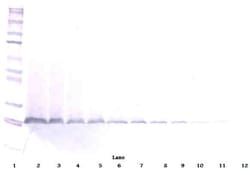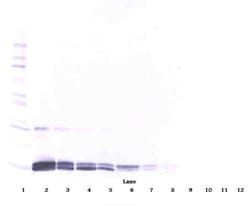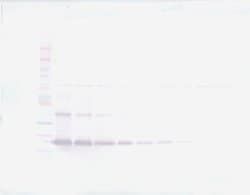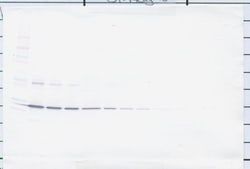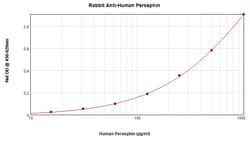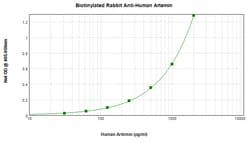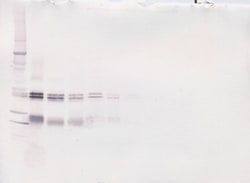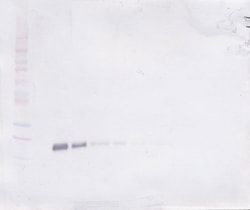7245396
Artemin Polyclonal Antibody, Biotin, PeproTech®, Invitrogen™
Rabbit Polyclonal Antibody
Manufacturer: Fischer Scientific
The price for this product is unavailable. Please request a quote
Antigen
Artemin
Applications
ELISA, Western Blot
Conjugate
Biotin
Host Species
Rabbit
Target Species
Human
Gene Accession No.
Q5T4W7
Gene ID (Entrez)
9048
Immunogen
E.coli-derived Recombinant Human Artemin
Purification Method
Antigen affinity chromatography
Gene
ARTN
Concentration
0.1-1.0 mg/mL
Classification
Polyclonal
Form
Lyophilized
Regulatory Status
RUO
Formulation
PBS with no preservative
Gene Alias
Artemin; ARTN; Enovin; EVN; NBN; neublastin; neurotrophic factor
Gene Symbols
ARTN
Primary or Secondary
Primary
Content And Storage
-20°C
Description
- AA Sequence of recombinant protein: AGGPGSRARA AGARGCRLRS QLVPVRALGL GHRSDELVRF RFCSGSCRRA RSPHDLSLAS LLGAGALRPP PGSRPVSQPC CRPTRYEAVS FMDVNSTWRT VDRLSATACG CLG
- Preparation: Produced from sera of rabbits immunized with highly pure Recombinant Human Artemin
- Anti-Human Artemin-specific antibody was purified by affinity chromatography and then biotinylated
- Sandwich ELISA: To detect hArtemin by sandwich ELISA (using 100 μL/well antibody solution) a concentration of 0.25-1.0 μg/mL of this antibody is required
- This biotinylated polyclonal antibody, in conjunction with PeproTech Polyclonal Anti-Human Artemin (500-P245) as a capture antibody, allows the detection of at least 0.2-0.4 ng/well of Recombinant hArtemin
- Western Blot: To detect hArtemin by Western Blot analysis this antibody can be used at a concentration of 0.1-0.2 μg/mL
- Used in conjunction with compatible secondary reagents the detection limit for Recombinant hArtemin is 1.5-3.0 ng/lane, under either reducing or non-reducing conditions
- 500-P245BT-1MG will be provided as 2 x 500 μg The protein encoded by this gene is a member of the glial cell line-derived neurotophic factor (GDNF) family of ligands which are a group of ligands within the TGF-beta superfamily of signaling molecules
- GDNFs are unique in having neurotrophic properties and have potential use for gene therapy in neurodegenerative disease
- Artemin has been shown in culture to support the survival of a number of peripheral neuron populations and at least one population of dopaminergic CNS neurons
- Its role in the PNS and CNS is further substantiated by its expression pattern in the proximity of these neurons
- This protein is a ligand for the RET receptor and uses GFR-alpha 3 as a coreceptor
- Multiple transcript variants encoding different isoforms have been found for this gene.
Compare Similar Items
Show Difference
Antigen: Artemin
Applications: ELISA, Western Blot
Conjugate: Biotin
Host Species: Rabbit
Target Species: Human
Gene Accession No.: Q5T4W7
Gene ID (Entrez): 9048
Immunogen: E.coli-derived Recombinant Human Artemin
Purification Method: Antigen affinity chromatography
Gene: ARTN
Concentration: 0.1-1.0 mg/mL
Classification: Polyclonal
Form: Lyophilized
Regulatory Status: RUO
Formulation: PBS with no preservative
Gene Alias: Artemin; ARTN; Enovin; EVN; NBN; neublastin; neurotrophic factor
Gene Symbols: ARTN
Primary or Secondary: Primary
Content And Storage: -20°C
Antigen:
Artemin
Applications:
ELISA, Western Blot
Conjugate:
Biotin
Host Species:
Rabbit
Target Species:
Human
Gene Accession No.:
Q5T4W7
Gene ID (Entrez):
9048
Immunogen:
E.coli-derived Recombinant Human Artemin
Purification Method:
Antigen affinity chromatography
Gene:
ARTN
Concentration:
0.1-1.0 mg/mL
Classification:
Polyclonal
Form:
Lyophilized
Regulatory Status:
RUO
Formulation:
PBS with no preservative
Gene Alias:
Artemin; ARTN; Enovin; EVN; NBN; neublastin; neurotrophic factor
Gene Symbols:
ARTN
Primary or Secondary:
Primary
Content And Storage:
-20°C
Antigen: IL-12 p70
Applications: ELISA, Western Blot
Conjugate: Biotin
Host Species: Goat
Target Species: Mouse
Gene Accession No.: P43431, P43432
Gene ID (Entrez): 16159, 16160
Immunogen: CHO cells-derived Recombinant Murine IL-12 p70
Purification Method: Antigen affinity chromatography
Gene: __
Concentration: 0.1-1.0 mg/mL
Classification: Polyclonal
Form: Lyophilized
Regulatory Status: RUO
Formulation: PBS with no preservative
Gene Alias: 20C2; CLMF; CLMF p35; CLMF p40; CLMF2; cytokine; cytotoxic lymphocyte maturation factor 1, p35; cytotoxic lymphocyte maturation factor 35 kDa subunit; Cytotoxic lymphocyte maturation factor 40 kDa subunit; il 12; IL 12p70; Il12; IL-12; Il-12 p35; IL-12 p75; IL-12 subunit p35; IL-12 subunit p40; IL-12, subunit p35; IL12, subunit p40; Il-12; cytokine; IL12A; IL-12A; IL12A/B; IL12AB; IL12B; Il-12b; IL12P35; IL-12p35; Il12p40; Il-12p40; IL35 subunit; ILN; IMD28; IMD29; Interleukin; interleukin 12 35 kDa subunit; interleukin 12 35kDa subunit; interleukin 12 40 kDa subunit; interleukin 12 40kDa subunit; interleukin 12 p35 subunit; interleukin 12 p40 subunit precursor; interleukin 12 polypeptide 35; interleukin 12, p35; interleukin 12, p40; interleukin 12A; interleukin 12A (natural killer cell stimulatory factor 1, cytotoxic lymphocyte maturation factor 1, p35); interleukin 12B; interleukin 12B (natural killer cell stimulatory factor 2, cytotoxic lymphocyte maturation factor 2, p40); interleu
Gene Symbols: IL12A, Il12b
Primary or Secondary: Primary
Content And Storage: -20°C
Antigen:
IL-12 p70
Applications:
ELISA, Western Blot
Conjugate:
Biotin
Host Species:
Goat
Target Species:
Mouse
Gene Accession No.:
P43431, P43432
Gene ID (Entrez):
16159, 16160
Immunogen:
CHO cells-derived Recombinant Murine IL-12 p70
Purification Method:
Antigen affinity chromatography
Gene:
__
Concentration:
0.1-1.0 mg/mL
Classification:
Polyclonal
Form:
Lyophilized
Regulatory Status:
RUO
Formulation:
PBS with no preservative
Gene Alias:
20C2; CLMF; CLMF p35; CLMF p40; CLMF2; cytokine; cytotoxic lymphocyte maturation factor 1, p35; cytotoxic lymphocyte maturation factor 35 kDa subunit; Cytotoxic lymphocyte maturation factor 40 kDa subunit; il 12; IL 12p70; Il12; IL-12; Il-12 p35; IL-12 p75; IL-12 subunit p35; IL-12 subunit p40; IL-12, subunit p35; IL12, subunit p40; Il-12; cytokine; IL12A; IL-12A; IL12A/B; IL12AB; IL12B; Il-12b; IL12P35; IL-12p35; Il12p40; Il-12p40; IL35 subunit; ILN; IMD28; IMD29; Interleukin; interleukin 12 35 kDa subunit; interleukin 12 35kDa subunit; interleukin 12 40 kDa subunit; interleukin 12 40kDa subunit; interleukin 12 p35 subunit; interleukin 12 p40 subunit precursor; interleukin 12 polypeptide 35; interleukin 12, p35; interleukin 12, p40; interleukin 12A; interleukin 12A (natural killer cell stimulatory factor 1, cytotoxic lymphocyte maturation factor 1, p35); interleukin 12B; interleukin 12B (natural killer cell stimulatory factor 2, cytotoxic lymphocyte maturation factor 2, p40); interleu
Gene Symbols:
IL12A, Il12b
Primary or Secondary:
Primary
Content And Storage:
-20°C
Antigen: TNFR2 (soluble)
Applications: ELISA, Western Blot
Conjugate: Biotin
Host Species: Rabbit
Target Species: Human
Gene Accession No.: P20333
Gene ID (Entrez): 7133
Immunogen: E.coli-derived, 18.9 kDa Recombinant Human TNF Receptor Type II
Purification Method: Antigen affinity chromatography
Gene: Tnfrsf1b
Concentration: 0.1-1.0 mg/mL
Classification: Polyclonal
Form: Lyophilized
Regulatory Status: RUO
Formulation: PBS with no preservative
Gene Alias: CD120b; Etanercept; p75; p75 TNF receptor; p75 TNFR; p75TNFR; p80 TNF-alpha receptor; sCD120b; soluble CD120b; soluble TNFR1B variant 1; soluble TNFR2; sTNF R2; sTNFR 2; sTNFR2; TBP-2; TBPII; TNF receptor beta chain; TNF receptor superfamily member 1B; TNF-alphaR2; TNFalpha-R2; TNFBR; TNFR; TNFR II; Tnfr-1; TNFR1B; TNFR2; TNF-R2; Tnfr-2; TNF-R75; TNFR80; TNFRII; TNF-RII; TNF-R-II; TNFR-II; TNFRSF1B; tumor necrosis factor beta receptor; tumor necrosis factor binding protein 2; Tumor necrosis factor receptor; tumor necrosis factor receptor 2; Tumor necrosis factor receptor superfamily member 1B; Tumor necrosis factor receptor superfamily member 1b, membrane form; tumor necrosis factor receptor superfamily, member 1B; tumor necrosis factor receptor type II; Tumor necrosis factor-binding protein 2
Gene Symbols: Tnfrsf1b
Primary or Secondary: Primary
Content And Storage: -20°C
Antigen:
TNFR2 (soluble)
Applications:
ELISA, Western Blot
Conjugate:
Biotin
Host Species:
Rabbit
Target Species:
Human
Gene Accession No.:
P20333
Gene ID (Entrez):
7133
Immunogen:
E.coli-derived, 18.9 kDa Recombinant Human TNF Receptor Type II
Purification Method:
Antigen affinity chromatography
Gene:
Tnfrsf1b
Concentration:
0.1-1.0 mg/mL
Classification:
Polyclonal
Form:
Lyophilized
Regulatory Status:
RUO
Formulation:
PBS with no preservative
Gene Alias:
CD120b; Etanercept; p75; p75 TNF receptor; p75 TNFR; p75TNFR; p80 TNF-alpha receptor; sCD120b; soluble CD120b; soluble TNFR1B variant 1; soluble TNFR2; sTNF R2; sTNFR 2; sTNFR2; TBP-2; TBPII; TNF receptor beta chain; TNF receptor superfamily member 1B; TNF-alphaR2; TNFalpha-R2; TNFBR; TNFR; TNFR II; Tnfr-1; TNFR1B; TNFR2; TNF-R2; Tnfr-2; TNF-R75; TNFR80; TNFRII; TNF-RII; TNF-R-II; TNFR-II; TNFRSF1B; tumor necrosis factor beta receptor; tumor necrosis factor binding protein 2; Tumor necrosis factor receptor; tumor necrosis factor receptor 2; Tumor necrosis factor receptor superfamily member 1B; Tumor necrosis factor receptor superfamily member 1b, membrane form; tumor necrosis factor receptor superfamily, member 1B; tumor necrosis factor receptor type II; Tumor necrosis factor-binding protein 2
Gene Symbols:
Tnfrsf1b
Primary or Secondary:
Primary
Content And Storage:
-20°C
Antigen: CXCL14
Applications: ELISA, Western Blot
Conjugate: Unconjugated
Host Species: Rabbit
Target Species: Human
Gene Accession No.: O95715
Gene ID (Entrez): 9547
Immunogen: E.coli-derived Recombinant Human BRAK (CXCL14)
Purification Method: Antigen affinity chromatography
Gene: Cxcl14
Concentration: 0.1-1.0 mg/mL
Classification: Polyclonal
Form: Lyophilized
Regulatory Status: RUO
Formulation: PBS with no preservative
Gene Alias: 1110031L23Rik; 1200006I23Rik; AI414372; B-cell and monocyte-activating chemokine; BMAC; bolekine; BRAK; breast and kidney; C Cmotif chemokine; C X C motif chemokine; CC motif chemokine; CCmotif chemokine; chemokine (C-X-C motif) ligand 14; chemokine BRAK; CXC; CXC chemokine in breast and kidney; CXC motif chemokine; C-X-C motif chemokine 14; C-X-C motif chemokine ligand 14; CXCL; Cxcl14; hypothetical protein LOC511771; Kec; Kidney-expressed chemokine CXC; KS1; MGC10687; MIP-2 gamma; MIP2G; MIP-2g; MIP2gamma; musculus CXC chemokine MIP-2gamma; NJAC; PSEC0212; SCYB14; small inducible cytokine B14; small inducible cytokine subfamily B (Cys-X-Cys), member 14; small inducible cytokine subfamily B (Cys-X-Cys), member 14 (BRAK); small-inducible cytokine B14; tumor-suppressing chemokine; UNQ240/PRO273
Gene Symbols: Cxcl14
Primary or Secondary: Primary
Content And Storage: -20°C
Antigen:
CXCL14
Applications:
ELISA, Western Blot
Conjugate:
Unconjugated
Host Species:
Rabbit
Target Species:
Human
Gene Accession No.:
O95715
Gene ID (Entrez):
9547
Immunogen:
E.coli-derived Recombinant Human BRAK (CXCL14)
Purification Method:
Antigen affinity chromatography
Gene:
Cxcl14
Concentration:
0.1-1.0 mg/mL
Classification:
Polyclonal
Form:
Lyophilized
Regulatory Status:
RUO
Formulation:
PBS with no preservative
Gene Alias:
1110031L23Rik; 1200006I23Rik; AI414372; B-cell and monocyte-activating chemokine; BMAC; bolekine; BRAK; breast and kidney; C Cmotif chemokine; C X C motif chemokine; CC motif chemokine; CCmotif chemokine; chemokine (C-X-C motif) ligand 14; chemokine BRAK; CXC; CXC chemokine in breast and kidney; CXC motif chemokine; C-X-C motif chemokine 14; C-X-C motif chemokine ligand 14; CXCL; Cxcl14; hypothetical protein LOC511771; Kec; Kidney-expressed chemokine CXC; KS1; MGC10687; MIP-2 gamma; MIP2G; MIP-2g; MIP2gamma; musculus CXC chemokine MIP-2gamma; NJAC; PSEC0212; SCYB14; small inducible cytokine B14; small inducible cytokine subfamily B (Cys-X-Cys), member 14; small inducible cytokine subfamily B (Cys-X-Cys), member 14 (BRAK); small-inducible cytokine B14; tumor-suppressing chemokine; UNQ240/PRO273
Gene Symbols:
Cxcl14
Primary or Secondary:
Primary
Content And Storage:
-20°C
